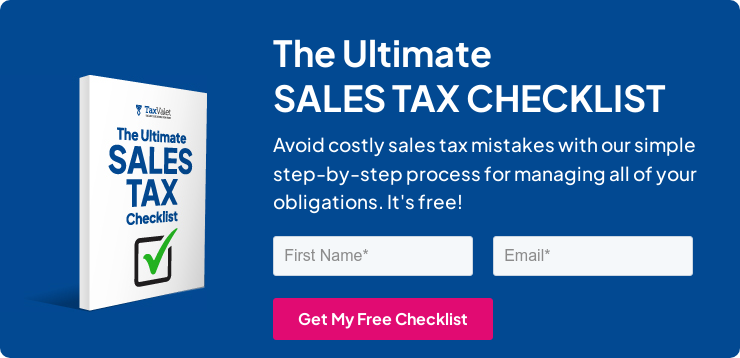Summary: Even if your business has not crossed economic nexus thresholds, some states have sales tax notice and reporting requirements with significant penalties. You can protect your business by registering for a sales tax permit if you’ve crossed the Notice and Reporting Requirements, but have not crossed the state’s economic nexus thresholds.
What Are Notice and Reporting Requirement Laws?
Before Economic Nexus existed, Notice and Reporting Requirement Laws were extremely popular with states because it allowed states to “force” businesses to register for sales and use tax permits without violating existing federal and constitutional rules regarding interstate commerce.
Notice and Reporting Requirement Laws work something like this: If your business has a certain level of sales in a state and you are not charging your customers’ sales tax, you can either:
- Notify each and every one of your purchasers of their obligation to voluntarily pay use tax on the purchase, and provide a report to the state with a list of your customers and their purchase history (an extremely arduous, if not impossible, task!)
OR…
2. Simply register for a sales/use tax permit in the state.
If businesses neither registered for a sales tax permit nor complied with the laws, they could be subject to substantial fines.
Many businesses were not keen to comply with these Notice and Reporting Requirements because they were difficult to deal with, and also provided states with significant information about their customers (which many watchdog groups deemed a privacy violation).
Aren’t Notice and Reporting Requirements a Thing of the Past?
When states began passing economic nexus laws, many states got rid of their old Notice and Reporting Requirement laws because they didn’t need the Notice and Reporting Laws anymore. They figured that if states were registering to pay sales tax, that was good enough.
And in most states, if they did not get rid of the law entirely, they revised the Notice and Reporting Requirement threshold so that it aligned with economic nexus laws. So for the most part, we don’t need to worry about Notice and Reporting Requirement Laws…
… except in a few very important states.
These are states that still have the laws on the books and their threshold for enforcing Notice and Reporting Requirements are substantially lower than their economic nexus threshold.
You need to pay careful attention to the following states (even if you haven’t crossed their economic nexus thresholds) and either comply with their Notice and Reporting Requirements or get a sales tax permit.

Colorado’s Notice and Reporting Requirement Laws Explained
Based on the recent information provided by the Colorado Department of Revenue, it appears that Colorado's Notice and Reporting Requirements may no longer be applicable to out-of-state retailers who do not have a physical presence in the state and whose sales fall below the economic nexus threshold. However, it is important to note that this interpretation is based on a General Information Letter (GIL 24-002) issued on March 4, 2024, and the Department's website and guidance publications have not yet been updated to reflect this change.
According to GIL 24-002, a retailer is considered to be doing business in Colorado and subject to the Notice and Reporting Requirements only if they:
a) Maintain, directly or indirectly, or through a subsidiary, any place of business in Colorado as described in section 39-26-102(3)(a), C.R.S., regardless of their retail sales volume in Colorado; or
b) Solicit business in Colorado as described in section 39-26-102(3)(b), C.R.S., and make retail sales in Colorado meeting or exceeding the economic nexus thresholds specified in section 39-26-102(3)(c), C.R.S.
This appears to contradict the current information on the Colorado Department of Revenue website and in Department Rule 39-21-112(3.5), which indicates that the Notice and Reporting Requirements apply to all non-collecting retailers, regardless of their sales volume or physical presence in the state.
We sought clarification from the Office of Tax Policy regarding this apparent discrepancy in 2024. The Office of Tax Policy acknowledged that relevant webpages and guidance publications need to be updated to align with the information provided in GIL 24-002. They also confirmed that several pages have been identified for potential revision or retirement, including:
- https://tax.colorado.gov/out-of-state-businesses
- https://tax.colorado.gov/use-tax-retailer-reporting-requirements
- https://tax.colorado.gov/consumer-use-tax-for-businesses
Given the non-binding nature of the General Information Letter and the pending updates to the Department's official resources, it is advisable to approach this information with caution. Out-of-state retailers should continue to monitor the Colorado Department of Revenue website for updates and consult with their tax professionals (like TaxValet) to determine their specific compliance requirements.
Louisiana’s Notice and Reporting Requirement Laws
| Louisiana’s Notice and Reporting Law Threshold | Louisiana’s Notice and Reporting sales threshold is $50,000 in total sales for the current or prior calendar year. |
| Louisiana’s Notice and Reporting Law Effective Date | 7/1/2017 |
| Louisiana’s Notice and Reporting Law Requirements |
To comply with Louisiana’s Notice and Reporting Law Requirement you must provide notice to the customer of their obligation to pay use tax at the time of sale, send a notice to every seller by January 31st of each year that they have a use tax obligation, and send a list of customers to the state by March 31st. Alternatively, you can voluntarily register to collect and remit Louisiana sales tax. |
| Louisiana’s Notice and Reporting Law Penalties | Penalties are not publicly available or published by the Department of Revenue, however broad enforcement powers have been granted to the agency. We expect enforcement to be heavy. |
Puerto Rico’s Notice and Reporting Requirement Laws
| Puerto Rico’s Notice and Reporting Law Threshold | Puerto Rico’s Notice and Reporting sales threshold is $0 (so a single sale can create a reporting obligation). |
| Puerto Rico’s Notice and Reporting Law Effective Date | 7/1/2017 |
| Puerto Rico’s Notice and Reporting Law Requirements |
To comply with Puerto Rico’s Notice and Reporting Law Requirement you must notify the buyer on their invoice or receipt that they need to pay tax directly to the government, provide a quarterly report to Puerto Rico with a list of all purchases made by residents, and provide an annual notice to purchasers each year, and provide the Treasury with a copy of each notice. Without a physical presence in Puerto Rico, you cannot get a sales tax permit instead of complying with Notice and Reporting requirements. |
| Puerto Rico’s Notice and Reporting Law Penalties | The penalty for not complying with Puerto Rico’s Notice and Reporting Requirements is $100 for each transaction. Failure to file a quarterly report is $5,000 for each failure. And failure to file the annual report is $500 for each failure. |
Vermont’s Notice and Reporting Requirement Laws
| Vermont’s Notice and Reporting Law Threshold | Vermont’s Notice and Reporting sales threshold is $0, meaning you have a reporting obligation the first time you make a sale. |
| Vermont’s Notice and Reporting Law Effective Date | 7/1/2017 |
| Vermont’s Notice and Reporting Law Requirements |
To comply with Vermont’s Notice and Reporting Requirement, you must provide notice to customers that they owe use tax at the time of sale, send a notice to every seller annually to all purchasers with more than $500 in sales, and provide a list to the states each year of customers that have purchasers larger than $500 (only sellers that have more than $100k in sales per year need to submit this annual report).
If a seller is making all of their sales on a marketplace facilitating sales tax, then complying with notice and reporting requirements is not required. Alternatively, you can voluntarily register to collect and remit Vermont sales tax. |
| Vermont’s Notice and Reporting Law Penalties | The penalty for not complying with Vermont’s Notice and Reporting Requirements is $5 for each failure to provide notice at the time of sale, and $10 for each failure relating to notifying the customer or state annually. |
Oklahoma: As of November 2019, Notice and Reporting requirements were repealed for Remote Sellers in Oklahoma and instead default to economic nexus provisions. Marketplace facilitators and referrers are subject to state tax at a lower threshold ($10K). You can find more information in Oklahoma’s tax statutes.
Pennsylvania: As outlined in Sales and Use Tax Bulletin 2019-01, the requirement to collect Pennsylvania’s sales tax is expanded to include businesses making at least $100,000 in annual Pennsylvania gross sales. Act 13 of 2019 has codified this rule, and removed the election and reporting requirements for sellers located outside of Pennsylvania.
More from TaxValet:
Get in Touch
Company
Disclaimer: Nothing on this page should be considered tax or legal advice. Information provided on this page is general in nature and is provided without warranty.
Copyright TaxValet 2023 | Privacy Policy | Site Map

Disclaimer: Our attorney wanted you to know that no financial, tax, legal advice or opinion is given through this post. All information provided is general in nature and may not apply to your specific situation and is intended for informational and educational purposes only. Information is provided “as is” and without warranty.
What you should do now
- Get a Free Sales Tax Plan and see how Tax Valet can help solve your sales tax challenges.
- Read more articles in our blog.
- If you know someone who’d enjoy this article, share it with them via Facebook, Twitter, LinkedIn, or email.






